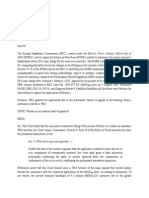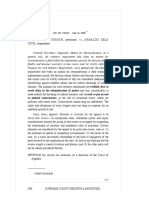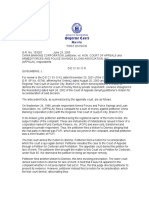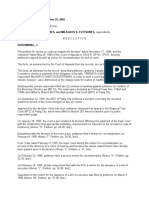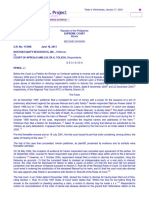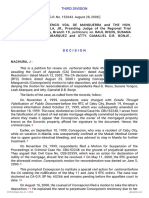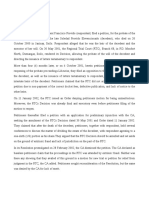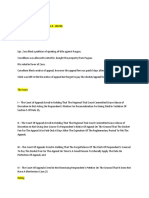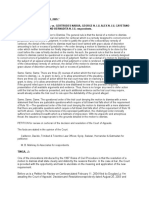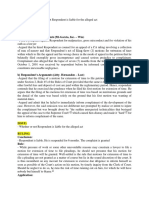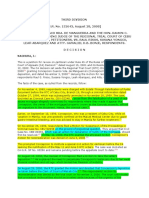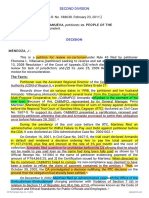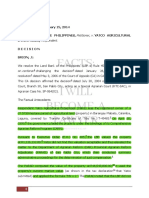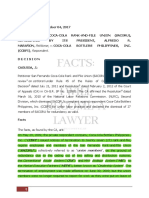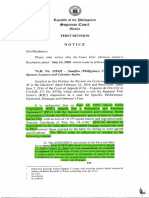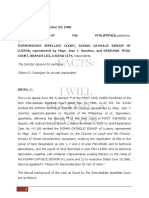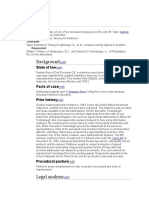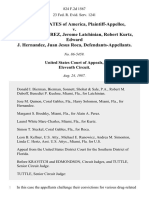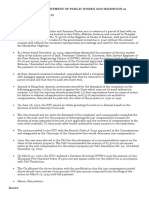Guasch Vs Dela Cruz (2009) PDF
Guasch Vs Dela Cruz (2009) PDF
Uploaded by
Joshua DulceCopyright:
Available Formats
Guasch Vs Dela Cruz (2009) PDF
Guasch Vs Dela Cruz (2009) PDF
Uploaded by
Joshua DulceOriginal Title
Copyright
Available Formats
Share this document
Did you find this document useful?
Is this content inappropriate?
Copyright:
Available Formats
Guasch Vs Dela Cruz (2009) PDF
Guasch Vs Dela Cruz (2009) PDF
Uploaded by
Joshua DulceCopyright:
Available Formats
FIRST DIVISION
G.R. No. 176015 June 16, 2009
MERCEDITA T. GUASCH, Petitioner,
vs.
ARNALDO DELA CRUZ, Respondent.
DECISION
PUNO, CJ.:
Before us is a Petition for Review1 on Certiorari under Rule 45 of the Rules of Court
to set aside the Decision2 dated August 31, 2006 of the Court of Appeals which
reversed the Order3 dated September 20, 2005 of the Regional Trial Court, Branch
50, Manila in Criminal Case No. 02-199357.
On November 10, 2000, respondent Arnaldo dela Cruz (respondent) filed a
Complaint-Affidavit4 against petitioner Mercedita T. Guasch (petitioner) with the City
Prosecutor of Manila. Respondent alleged that petitioner was his neighbor and
kumadre. On several occasions, petitioner transacted business with him by
exchanging cash for checks of small amount without interest. On July 26, 1999,
petitioner went to his residence requesting him to exchange her check with cash of
₱3,300,000.00. Initially, he refused. However, petitioner returned the next day and
was able to convince him to give her ₱3,300,000.00 in cash in exchange for her
Insular Savings Bank Check No. 0032082 dated January 31, 2000 upon her
assurance that she will have the funds and bank deposit to cover the said check by
January 2000. On the date of maturity and upon presentment, however, the check
was dishonored for the reason that the account against which it was drawn was
already closed.
On March 2, 2001, the City Prosecutor of Manila issued a Resolution5 recommending
that an information for estafa be filed against petitioner. On February 7, 2002, the
City Prosecutor of Manila filed an Information6 for estafa against petitioner. The
case was docketed as Criminal Case No. 02-199357 and raffled to Honorable William
Simon P. Peralta, Presiding Judge of the Regional Trial Court, Branch 50, Manila.
1 If you want to become a lawyer, KEEP ON STUDYING!
After petitioner entered her plea of not guilty and after the prosecution rested its
case, petitioner filed a Motion With Leave To Admit Demurrer to Evidence7 with
attached Demurrer to Evidence8 on April 1, 2005.
The trial court issued an Order9 dated June 16, 2005 granting the demurrer to
evidence and dismissing the case. The trial court found that respondent’s assertion
of misrepresentation by petitioner that her check will be fully funded on the maturity
date was not supported by the evidence on record. Accordingly, her guilt not having
been proven beyond reasonable doubt, petitioner was acquitted.
On June 28, 2005, respondent received a copy of the said order. On July 14, 2005,
respondent filed a Manifestation10 with attached Motion to Amend Order dated June
16, 200511 (Motion to Amend) to include a finding of civil liability of petitioner. In
the Manifestation, respondent’s counsel justified his failure to file the motion within
the reglementary period of 15 days because all postal offices in Metro Manila were
allegedly ordered closed in the afternoon due to the rally staged on Ayala Avenue.
Meantime, on August 30, 2005, respondent filed a Petition for Certiorari12 with the
Court of Appeals praying that the trial court’s Order dated June 16, 2005 granting
the demurrer to evidence be set aside.
The trial court denied respondent’s Motion to Amend in its Order13 dated September
20, 2005 finding that counsel for respondent was inexcusably negligent; hence, the
Order dated June 16, 2005 has become final and executory. Respondent filed a
Motion for Reconsideration14 but the same was denied by the trial court in its
Order15 dated November 7, 2005.
On December 7, 2005, respondent filed a Notice of Appeal16 informing the trial
court that he was appealing the Order dated September 20, 2005 and the Order
dated November 7, 2005. The trial court likewise denied the notice of appeal in an
Order17 dated December 13, 2005.
Consequently, on February 13, 2006, respondent filed a Supplemental Petition for
Certiorari18 with the Court of Appeals to set aside the Order dated September 20,
2005, the Order dated November 7, 2005, and the Order dated December 13, 2005.
2 If you want to become a lawyer, KEEP ON STUDYING!
On August 31, 2006, the Court of Appeals rendered the assailed Decision.19 On the
issue of whether the issuance of the Order dated June 16, 2005 granting the
demurrer to evidence was made with grave abuse of discretion, the Court of Appeals
ruled in the negative as it found that the trial court did not anchor the acquittal of
petitioner on evidence other than that presented by the prosecution as contended by
petitioner. On the issue of whether the denial of respondent’s Motion to Amend was
tainted with grave abuse of discretion, the Court of Appeals ruled in the affirmative.
The Court of Appeals ratiocinated that matters of paramount importance outweigh
rules of procedure in this instance. Accordingly, the Court of Appeals ruled as
follows:
WHEREFORE, the assailed order dated September 20, 2005 denying petitioner’s
Motion to Amend Order dated 16 [June] 2005 is hereby SET ASIDE. Public
respondent is hereby directed to determine and fix the amount due the petitioner.
SO ORDERED.
Petitioner filed a Motion for Partial Reconsideration20 arguing that the Court of
Appeals erred in ruling that the trial court committed grave abuse of discretion when
it denied respondent’s Motion to Amend. However, the same was denied by the
Court of Appeals in its Resolution21 dated December 20, 2006.
Hence, this petition.
The lone issue in this case is whether the Court of Appeals erred in holding that the
trial court committed grave abuse of discretion when it denied respondent’s Motion
to Amend.
We affirm the ruling of the Court of Appeals.
Respondent contends that the delay of one day in filing his motion was due to
circumstances beyond his control. He submitted a Certification22 from the Makati
Central Post Office stating that it was closed in the afternoon of July 13, 2005 due to
the rally along Ayala Avenue per declaration by the City Mayor.
3 If you want to become a lawyer, KEEP ON STUDYING!
Petitioner, on the one hand, alleges that the denial of respondent’s Motion to Amend
was due to the inexcusable negligence of respondent’s counsel; hence, the trial
court did not commit grave abuse of discretion. Furthermore, the Order dated June
16, 2005 granting the demurrer to evidence has become final and executory and the
remedy of certiorari cannot be used as a substitute for a lost appeal.
Respondent’s counsel received a copy of the Order dated June 16, 2005 granting the
demurrer to evidence on June 28, 2005. However, he only filed his Motion to Amend
on July 14, 2005 which was one day beyond the 15-day reglementary period to file a
motion for reconsideration of final orders of the trial court pursuant to Section 1,
Rule 37 of the Rules of Court.1avvphil
As a general rule, the statutory requirement that when no motion for reconsideration
is filed within the reglementary period, the decision attains finality and becomes
executory in due course must be strictly enforced as they are considered
indispensable interdictions against needless delays and for orderly discharge of
judicial business. The purposes for such statutory requirement are twofold: first, to
avoid delay in the administration of justice and thus, procedurally, to make orderly
the discharge of judicial business, and, second, to put an end to judicial
controversies, at the risk of occasional errors, which are precisely why courts exist.
Controversies cannot drag on indefinitely. The rights and obligations of every litigant
must not hang in suspense for an indefinite period of time.23
However, in exceptional cases, substantial justice and equity considerations warrant
the giving of due course to an appeal by suspending the enforcement of statutory
and mandatory rules of procedure.24 Certain elements are considered for the appeal
to be given due course, such as: (1) the existence of special or compelling
circumstances, (2) the merits of the case, (3) a cause not entirely attributable to the
fault or negligence of the party favored by the suspension of the rules, (4) lack of
any showing that the review sought is merely frivolous and dilatory, and (5) the
other party will not be unduly prejudiced thereby.25
Several of these elements obtain in the case at bar.
4 If you want to become a lawyer, KEEP ON STUDYING!
First, there is ostensible merit to respondent’s cause. The records show that
petitioner admits her civil obligation to respondent. In her Kontra-
Salaysay,26 petitioner alleged that she owed respondent a total of ₱3,300,000.00 as
a result of their joint lending business whereby petitioner borrows money from
respondent with interest and petitioner, in turn, lends the money to her clients.
Respondent did not waive, reserve, nor institute a civil action for the recovery of civil
liability. As correctly observed by the Court of Appeals, respondent’s actual and
active participation in the criminal proceedings through a private prosecutor leaves
no doubt with respect to his intentions to press a claim for the unpaid obligation of
petitioner in the same action. Hence, since the civil action is deemed instituted with
the criminal action, the trial court was duty-bound to determine the civil liability of
petitioner pursuant to paragraph 2, Section 2, Rule 120 of the Rules on Criminal
Procedure which provides:
SECTION 2. Contents of the judgment. —
xxx
In case the judgment is of acquittal, it shall state whether the evidence of the
prosecution absolutely failed to prove the guilt of the accused or merely failed to
prove his guilt beyond reasonable doubt. In either case, the judgment shall
determine if the act or omission from which the civil liability might arise did not exist.
(2a)
Second, it cannot be said that petitioner will be unduly prejudiced if respondent’s
Motion to Amend for the sole purpose of including the civil liability of petitioner in
the order of acquittal shall be allowed. Foremost, petitioner admits her civil
obligation to respondent. Respondent concededly has an available remedy even if
his Motion to Amend was denied, which is to institute a separate civil action to
recover petitioner’s civil liability. However, to require him to pursue this remedy at
this stage will only prolong the litigation between the parties which negates the
avowed purpose of the strict enforcement of reglementary periods to appeal, that is,
to put an end to judicial controversies. Not only will that course of action be a waste
5 If you want to become a lawyer, KEEP ON STUDYING!
of time, but also a waste of the resources of both parties and the court as well. We
agree with the following observation made by the Court of Appeals:
To sustain the denial of the Motion to Amend the Order of June 16, 2005 on the
ground that the private respondent was acquitted and the order of acquittal had
already attained its final and executory stage simply because the motion was filed
beyond the time fixed by the rules will necessarily constrained (sic) petitioner to
institute a separate civil action which in the end results in needless clogging of court
dockets and unnecessary duplication of litigation with all its attendant loss of time,
effort and money on the part of all concerned. Finally, the amendment of the order
of acquittal for the sole purpose of including therein the civil liability of private
complainant will not unduly prejudice her. It bears stressing that private complainant
was the first to agree that the transaction is a loan and she never denied but even
admitted her debt or obligation to herein petitioner.27 (Emphasis supplied)
A review of the records below shows that the evidence to make a determination of
petitioner’s civil liability is already at the disposal of the trial court. For example, the
checks covering the amounts owed by petitioner to respondent in the total amount
of ₱3,300,000.00 were already submitted by petitioner to the trial court as Annexes
to the Motion to Quash28 that she filed. Neither can it be said that petitioner’s right
to due process shall be violated if her civil liability be determined in the same case.
In Padilla v. Court of Appeals,29 we held:
There appear to be no sound reasons to require a separate civil action to still be filed
considering that the facts to be proved in the civil case have already been
established in the criminal proceedings where the accused was acquitted. Due
process has been accorded the accused. He was, in fact, exonerated of the criminal
charged. The constitutional presumption of innocence called for more vigilant efforts
on the part of prosecuting attorneys and defense counsel, a keener awareness by all
witnesses of the serious implications of perjury, and a more studied consideration by
the judge of the entire records and of applicable statutes and precedents. To require
a separate civil action simply because the accused was acquitted would mean
needless clogging of court dockets and unnecessary duplication of litigation with all
6 If you want to become a lawyer, KEEP ON STUDYING!
its attendant loss of time, effort, and money on the part of all concerned. (emphasis
supplied)
As we ruled in Gayos v. Gayos,30 "it is a cherished rule of procedure that a court
should always strive to settle the entire controversy in a single proceeding leaving no
root or branch to bear the seeds of future litigation." Given the circumstances in this
case, we find that the trial court committed grave abuse of discretion when it denied
respondent’s Motion to Amend.
IN VIEW WHEREOF, the petition is DENIED. The decision of the Court of Appeals is
affirmed. No pronouncement as to costs.
SO ORDERED.
REYNATO S. PUNO
Chief Justice
WE CONCUR:
ANTONIO T. CARPIO
Associate Justice
RENATO C. CORONA MINITA V. CHICO-NAZARIO*
Associate Justice Associate Justice
TERESITA J. LEONARDO-DE CASTRO
Associate Justice
CERTIFICATION
Pursuant to Section 13, Article VIII of the Constitution, I certify that the conclusions
in the above decision had been reached in consultation before the case was
assigned to the writer of the opinion of the Court’s Division.
REYNATO S. PUNO
Chief Justice
7 If you want to become a lawyer, KEEP ON STUDYING!
Footnotes
* Additional member per Raffle dated June 8, 2009, vice J. Lucas P. Bersamin who
inhibited.
1 Rollo, pp. 9-18.
2 Id. at 19-22, 27-33; penned by Associate Justice Mariano C. Del Castillo and
concurred in by Associate Justices Lucas P. Bersamin and Normandie B. Pizarro.
3 Records, pp. 364-366.
4 Id. at 6-8.
5 Id. at 2-4.
6 Id. at 1.
7 Id. at 310-311.
8 Id. at 312-319.
9 Id. at 328-334.
10 Id. at 335-337.
11 Id. at 338-342.
12 CA rollo, pp. 2-15.
13 Records, pp. 364-366.
14 Id. at 369-376.
15 Id. at 378.
16 Id. at 393.
17 Id. at 400-401.
8 If you want to become a lawyer, KEEP ON STUDYING!
18 CA rollo, pp. 139-154.
19 Supra note 2.
20 CA rollo, pp. 233-238.
21 Id. at 276.
22 Id. at 196.
23 Ginete v. Court of Appeals, G.R. No. 127596, September 24, 1998, 296 SCRA 38,
54.
24 Philippine National Bank v. Court of Appeals, G.R. No. 108870, July 14, 1995, 246
SCRA 304; Siguenza v. Court of Appeals, G.R. No. L-44050, July 16, 1985, 137 SCRA
570, 576; Gutierrez v. Secretary of Labor, G.R. No. 142248, December 16, 2004, 447
SCRA 107, 122.
25 Supra note 23 at 53.
26 Records, pp. 12-17.
27 Supra note 2 at 31-32.
28 Records, pp. 82-94.
29 G.R. No. L-39999, May 31, 1984, 129 SCRA 558, 567.
30 G.R. No. L-27812, September 26, 1975, 67 SCRA 146, 151.
9 If you want to become a lawyer, KEEP ON STUDYING!
You might also like
- Vargas vs. Rilloraza, Et Al. (G.R. No. L-1612)Document1 pageVargas vs. Rilloraza, Et Al. (G.R. No. L-1612)Mt. CarmelNo ratings yet
- Nasecore V Erc Case DigestDocument2 pagesNasecore V Erc Case DigestJayson Ababa100% (1)
- Guasch v. Dela CruzDocument9 pagesGuasch v. Dela CruzChristine Karen BumanlagNo ratings yet
- Guasch V Dela CruzDocument2 pagesGuasch V Dela CruzMeemy GarciaNo ratings yet
- G.R. No. 173946 June 19, 2013 Boston Equity Resources, Inc., Petitioner, Court of Appeals and Lolita G. Toledo, RespondentsDocument9 pagesG.R. No. 173946 June 19, 2013 Boston Equity Resources, Inc., Petitioner, Court of Appeals and Lolita G. Toledo, RespondentsDhin CaragNo ratings yet
- Boston Equity Vs CA G.R. No. 173946 June 19, 2013Document15 pagesBoston Equity Vs CA G.R. No. 173946 June 19, 2013herbs22225847No ratings yet
- Boston Equity Resources V CADocument16 pagesBoston Equity Resources V CAyasuren2No ratings yet
- Bonsubre v. Yerro, 11 February 2015Document6 pagesBonsubre v. Yerro, 11 February 2015Jaime Rariza Jr.No ratings yet
- Banking Cases Batch 3Document12 pagesBanking Cases Batch 3secondqueenNo ratings yet
- Boston Equity Vs CADocument24 pagesBoston Equity Vs CAkonvanNo ratings yet
- Capuz Vs CaDocument4 pagesCapuz Vs CaRose Ann CalanglangNo ratings yet
- G.R. No. 153267Document4 pagesG.R. No. 153267Joy GamboaNo ratings yet
- Alejandro NG Wee vs. TankianseeDocument4 pagesAlejandro NG Wee vs. TankianseeJessica AbadillaNo ratings yet
- China Bank Vs CA: 153267: June 23, 2005: J. Quisumbing: First Division: DecisionDocument4 pagesChina Bank Vs CA: 153267: June 23, 2005: J. Quisumbing: First Division: DecisionAlyssa MateoNo ratings yet
- G.R. No. 209295 February 11, 2015 DIANA YAP-CO, Petitioner, vs. SPOUSES WILLIAM T. UY and ESTER GO-UY, RespondentsDocument3 pagesG.R. No. 209295 February 11, 2015 DIANA YAP-CO, Petitioner, vs. SPOUSES WILLIAM T. UY and ESTER GO-UY, RespondentsbelleNo ratings yet
- Uy v. First Metro Integrated Steel (Borja)Document7 pagesUy v. First Metro Integrated Steel (Borja)ernojohnmier24No ratings yet
- UIRINO TOMLIN II, Complainant, v. ATTY. SALVADOR N. MOYADocument5 pagesUIRINO TOMLIN II, Complainant, v. ATTY. SALVADOR N. MOYAErikha AranetaNo ratings yet
- Case Digest 8Document2 pagesCase Digest 8Princess PanNo ratings yet
- 900 - G.R. No. 200759Document11 pages900 - G.R. No. 200759Queena NasinopaNo ratings yet
- Casalla Vs People of The PhilippinesDocument3 pagesCasalla Vs People of The PhilippinesEgo sum pulcherNo ratings yet
- BIBIANADocument4 pagesBIBIANAAlfred DanezNo ratings yet
- Benares Vs LimDocument4 pagesBenares Vs LimJelyn Delos Reyes TagleNo ratings yet
- Boston Equity Resources v. Court of Appeals, G.R. No. 173946, June 19, 2013Document11 pagesBoston Equity Resources v. Court of Appeals, G.R. No. 173946, June 19, 2013Raphael Antonio PunzalanNo ratings yet
- Guasch V Dela CruzDocument2 pagesGuasch V Dela CruznhiamzNo ratings yet
- Case Digest 3 - Legal Ethics (Fil Garcia vs. HernandezDocument3 pagesCase Digest 3 - Legal Ethics (Fil Garcia vs. HernandezTom HerreraNo ratings yet
- Case CrimproDocument7 pagesCase CrimproJia Chu ChuaNo ratings yet
- Macapagal Vs People (2014)Document8 pagesMacapagal Vs People (2014)Joshua DulceNo ratings yet
- 185 FAJ Construction v. Saulog (Mozo)Document2 pages185 FAJ Construction v. Saulog (Mozo)JUAN MIGUEL MOZONo ratings yet
- LuDocument11 pagesLuDaley CatugdaNo ratings yet
- Rule 30 To 36 Case Digest Civil ProcedureDocument20 pagesRule 30 To 36 Case Digest Civil ProcedureRio Barrot100% (1)
- Golango v. Jone B. FungDocument3 pagesGolango v. Jone B. FungKrisha Marie CarlosNo ratings yet
- Paramount Vs AC OrdonezDocument12 pagesParamount Vs AC OrdonezCielo Revilla SantosNo ratings yet
- Sebastian v. Bajar, AC 3731, 2007Document12 pagesSebastian v. Bajar, AC 3731, 2007Julius ReyesNo ratings yet
- China Bank Vs CADocument4 pagesChina Bank Vs CACarlo ImperialNo ratings yet
- Alaban vs. CADocument2 pagesAlaban vs. CAYanilyAnnVldzNo ratings yet
- Civpro Latest Cases 2017Document200 pagesCivpro Latest Cases 2017Lex DagdagNo ratings yet
- OSCAR Z. BENARES, 1 Petitioner, Vs - JOSEPHINE LIM, Respondents.Document5 pagesOSCAR Z. BENARES, 1 Petitioner, Vs - JOSEPHINE LIM, Respondents.christian villamanteNo ratings yet
- Lamberto Casalla vs. People of The Philippines and Milagros S. EstevanesDocument3 pagesLamberto Casalla vs. People of The Philippines and Milagros S. EstevanesKP SelivaNo ratings yet
- CPM CasesDocument17 pagesCPM CasesAlbertjohn ZamarNo ratings yet
- Bonsubre v. Yerro, GR 205952Document6 pagesBonsubre v. Yerro, GR 205952Elaiza HilasgueNo ratings yet
- 004. Uy vs First Metro Integrated Steel Corporation G.R. No. 503 SCRA 704, 712Document5 pages004. Uy vs First Metro Integrated Steel Corporation G.R. No. 503 SCRA 704, 712bayabao.hedayatul.ymanNo ratings yet
- For Trust Receipts - Metrobank vs. Sec Raul GonzalesDocument7 pagesFor Trust Receipts - Metrobank vs. Sec Raul Gonzalesmmabbun001No ratings yet
- G.R. No. 193217 February 26, 2014 CORAZON MACAPAGAL, Petitioner, People of The Philippines, RespondentDocument16 pagesG.R. No. 193217 February 26, 2014 CORAZON MACAPAGAL, Petitioner, People of The Philippines, RespondentsofiaNo ratings yet
- CASES Set 2 Personal DigestDocument76 pagesCASES Set 2 Personal DigestAngelie AbangNo ratings yet
- Quirino Tomlin II Vs Atty Salvador N Moya IIDocument6 pagesQuirino Tomlin II Vs Atty Salvador N Moya IIDane DagatanNo ratings yet
- G.R. No. 193217Document3 pagesG.R. No. 193217Abby EvangelistaNo ratings yet
- Ym VS NabuaDocument8 pagesYm VS NabuaJesse RazonNo ratings yet
- Gajudo vs. Traders Royal BankDocument13 pagesGajudo vs. Traders Royal BankoscarletharaNo ratings yet
- Fil-Garcia Inc. v. Hernandez, AC 7129, 2008Document8 pagesFil-Garcia Inc. v. Hernandez, AC 7129, 2008Jerald Oliver MacabayaNo ratings yet
- Magdayao vs. People, G.R. No. 152881, August 17, 2004Document11 pagesMagdayao vs. People, G.R. No. 152881, August 17, 2004angelouveNo ratings yet
- Uy v. First Metro Integrated Steel Corp.Document5 pagesUy v. First Metro Integrated Steel Corp.MADEE VILLANUEVANo ratings yet
- Maria Antonia Siguan V LimDocument6 pagesMaria Antonia Siguan V LimMicah Clark-MalinaoNo ratings yet
- Cuenca Vs de MontejoDocument5 pagesCuenca Vs de MontejoKim ChanNo ratings yet
- 7 Uy v. First Metro Integrated Steel Corp.20160306-3896-1dyymu9Document6 pages7 Uy v. First Metro Integrated Steel Corp.20160306-3896-1dyymu9denbar15No ratings yet
- Villanueva v. PeopleDocument8 pagesVillanueva v. PeopleVanessa C. RoaNo ratings yet
- G.R. No. 200759Document10 pagesG.R. No. 200759ZackNo ratings yet
- Rule 40-56 AppealsDocument30 pagesRule 40-56 AppealsTerry FordNo ratings yet
- Case 4 Vda. de Manguerra v. RisosDocument8 pagesCase 4 Vda. de Manguerra v. RisosMark De JesusNo ratings yet
- Persons CasesDocument23 pagesPersons Casesheidi marieNo ratings yet
- GR 151098 Gajudo V Traders Royal BankDocument8 pagesGR 151098 Gajudo V Traders Royal BankRogie ToriagaNo ratings yet
- 9 Doles VS AngelesDocument7 pages9 Doles VS AngelesEisley SarzadillaNo ratings yet
- Supreme Court Eminent Domain Case 09-381 Denied Without OpinionFrom EverandSupreme Court Eminent Domain Case 09-381 Denied Without OpinionNo ratings yet
- Falcis Vs Civil Registrar (2019)Document215 pagesFalcis Vs Civil Registrar (2019)Joshua DulceNo ratings yet
- City of Manila Vs Cosmos Bottling Corporation (2018)Document19 pagesCity of Manila Vs Cosmos Bottling Corporation (2018)Joshua DulceNo ratings yet
- Lagon Vs Velasco (2018)Document13 pagesLagon Vs Velasco (2018)Joshua DulceNo ratings yet
- Fua Cun Vs Summers (1923)Document6 pagesFua Cun Vs Summers (1923)Joshua DulceNo ratings yet
- LBP Vs Yatco (2014)Document24 pagesLBP Vs Yatco (2014)Joshua DulceNo ratings yet
- Sheppard Vs Maxwell (1966)Document32 pagesSheppard Vs Maxwell (1966)Joshua DulceNo ratings yet
- Lanuza Vs CA (2005)Document16 pagesLanuza Vs CA (2005)Joshua DulceNo ratings yet
- Lagon Vs Velasco (2018)Document13 pagesLagon Vs Velasco (2018)Joshua DulceNo ratings yet
- SACORU Vs Coca Cola Bottlers (2017)Document17 pagesSACORU Vs Coca Cola Bottlers (2017)Joshua DulceNo ratings yet
- VICEU Vs Visayan Electric Company (2021)Document5 pagesVICEU Vs Visayan Electric Company (2021)Joshua DulceNo ratings yet
- Sumifru Vs Spouses Burbe (2020)Document6 pagesSumifru Vs Spouses Burbe (2020)Joshua DulceNo ratings yet
- Slord Development Corporation Vs Noya (2019)Document14 pagesSlord Development Corporation Vs Noya (2019)Joshua DulceNo ratings yet
- Republic Vs IAC (1988)Document13 pagesRepublic Vs IAC (1988)Joshua DulceNo ratings yet
- Dulay Enterprises Vs CA (1993)Document12 pagesDulay Enterprises Vs CA (1993)Joshua DulceNo ratings yet
- Jose Noel Meza-Perez, A029 269 568 (BIA Feb. 28, 2011)Document3 pagesJose Noel Meza-Perez, A029 269 568 (BIA Feb. 28, 2011)Immigrant & Refugee Appellate Center, LLCNo ratings yet
- NAESS Shipping Philippines vs. NLRC (Case)Document5 pagesNAESS Shipping Philippines vs. NLRC (Case)jomar icoNo ratings yet
- Northwest Orient Airlines V. Ca and CF Sharp & CompanyDocument2 pagesNorthwest Orient Airlines V. Ca and CF Sharp & CompanyKylie Kaur Manalon DadoNo ratings yet
- G.R. No. 135805 - Civil Service Commission v. Dacoycoy PDFDocument29 pagesG.R. No. 135805 - Civil Service Commission v. Dacoycoy PDFMae ReyesNo ratings yet
- Evidence Case AnalysisDocument3 pagesEvidence Case AnalysisAshokNo ratings yet
- United States v. Alain Asland Perez, Jerome Latchinian, Robert Kurtz, Edward J. Hernandez, Juan Jesus Roca, 824 F.2d 1567, 11th Cir. (1987)Document9 pagesUnited States v. Alain Asland Perez, Jerome Latchinian, Robert Kurtz, Edward J. Hernandez, Juan Jesus Roca, 824 F.2d 1567, 11th Cir. (1987)Scribd Government DocsNo ratings yet
- Tennessee Inmate Search Department of Corrections LookupDocument9 pagesTennessee Inmate Search Department of Corrections Lookupinmatesearchinfo50% (2)
- Motion To Reduce Bail GarciaDocument2 pagesMotion To Reduce Bail GarciaRaffy PangilinanNo ratings yet
- Kmu Vs Neda and Ople Vs TorresDocument17 pagesKmu Vs Neda and Ople Vs TorresRon GamboaNo ratings yet
- Secretary of The Department of Public Works and Highways vs. Spouses Tecson G.R. No. 179334, July 01, 2013Document2 pagesSecretary of The Department of Public Works and Highways vs. Spouses Tecson G.R. No. 179334, July 01, 2013Dawn Jessa GoNo ratings yet
- PSC Letter To UtilitiesDocument5 pagesPSC Letter To UtilitiesTim KnaussNo ratings yet
- People vs. DigoroDocument1 pagePeople vs. DigoroDAblue ReyNo ratings yet
- Sec. 25, Rule 130 Report - FinalDocument17 pagesSec. 25, Rule 130 Report - FinalErmeline Tampus100% (1)
- Equal Protection ClauseDocument2 pagesEqual Protection ClauseCindy-chan DelfinNo ratings yet
- OrceoDocument2 pagesOrceoEthan ZacharyNo ratings yet
- Q Phillips PetitionDocument4 pagesQ Phillips Petitionthe kingfishNo ratings yet
- Hist. Assign.Document17 pagesHist. Assign.priyanshushawarn8183No ratings yet
- CIR vs. MitsubishiDocument13 pagesCIR vs. MitsubishiColeen Navarro-RasmussenNo ratings yet
- Benzer MotionDocument4 pagesBenzer MotionLas Vegas Review-JournalNo ratings yet
- (Tax 1) (Phil. Match v. Cebu)Document3 pages(Tax 1) (Phil. Match v. Cebu)Ylmir_1989No ratings yet
- Reema MootDocument2 pagesReema MootRaja SahilNo ratings yet
- Becmen Service vs. CuaresmaDocument6 pagesBecmen Service vs. CuaresmaCyruss Xavier Maronilla NepomucenoNo ratings yet
- Tax Evasion and The Proceeds of Crime Act 2002Document21 pagesTax Evasion and The Proceeds of Crime Act 2002punktlichNo ratings yet
- Motion To Amend The Complaint For CondemnationDocument13 pagesMotion To Amend The Complaint For CondemnationIndiana Public Media NewsNo ratings yet
- Piccininni Vs Hajus, 180 Conn. 369, 429 A.2d 886 (1980)Document5 pagesPiccininni Vs Hajus, 180 Conn. 369, 429 A.2d 886 (1980)akosiJRNo ratings yet
- Judge Lori Bolton Fleming Complaint 06-18-2015 #1Document13 pagesJudge Lori Bolton Fleming Complaint 06-18-2015 #1Conflict GateNo ratings yet
- G.R. No. 135882Document3 pagesG.R. No. 135882Loren MandaNo ratings yet
- Mahbub Shah Vs Emperor On 31 January, 1945Document5 pagesMahbub Shah Vs Emperor On 31 January, 1945VivekNo ratings yet

